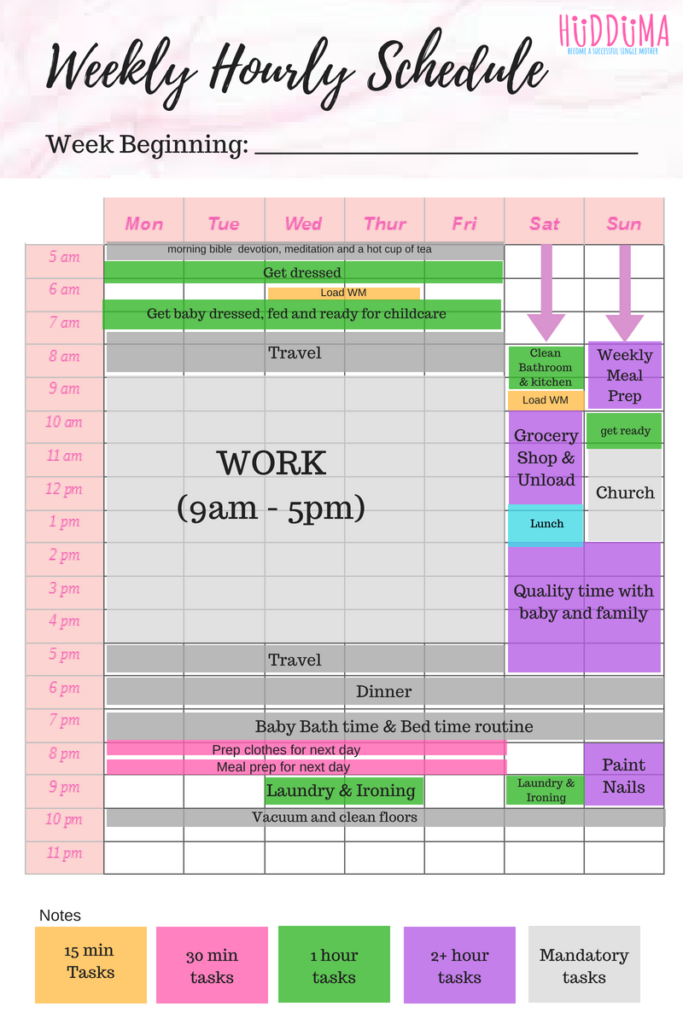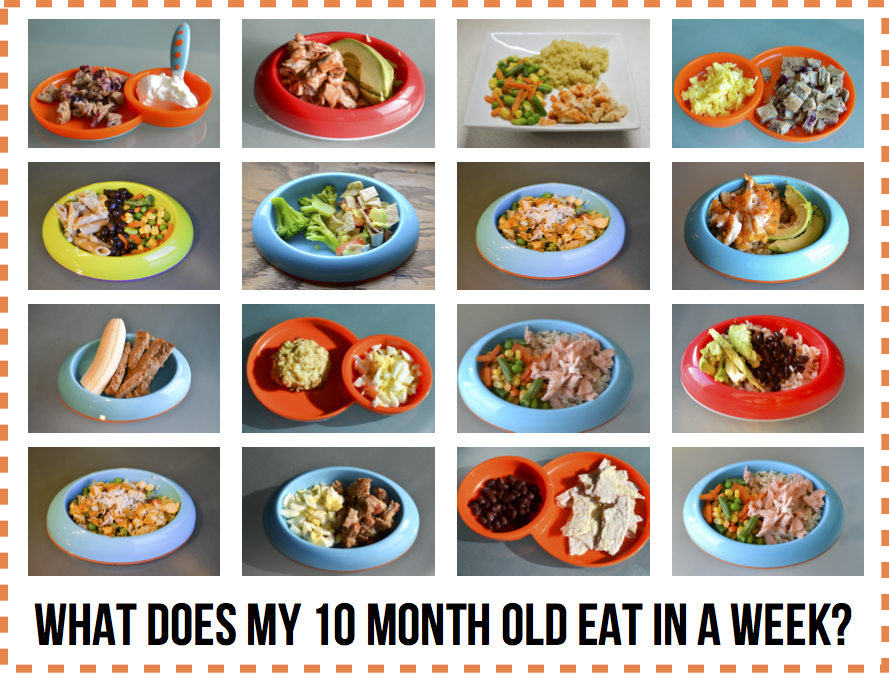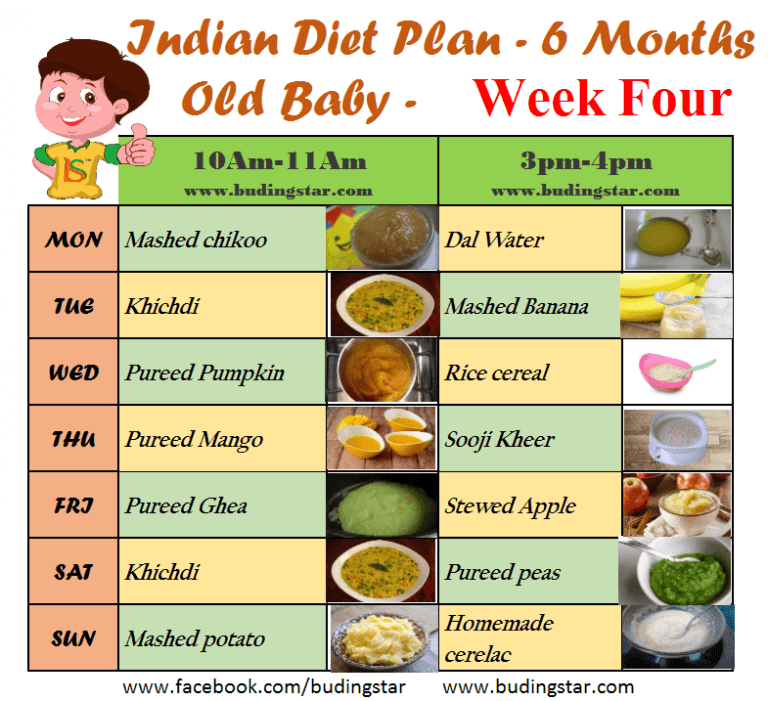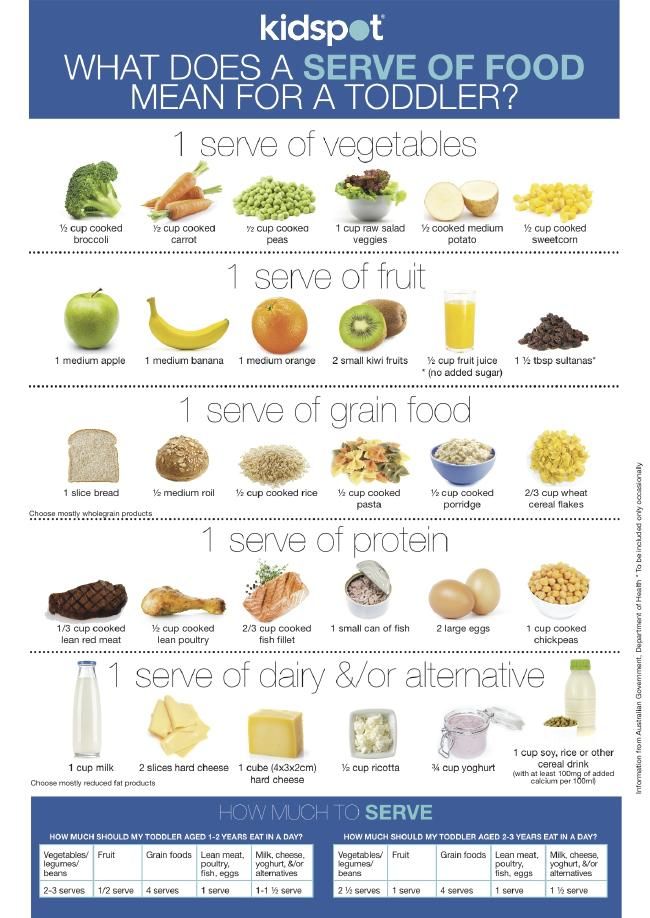How to set baby feeding schedule
Tips for the First Year
Eat, sleep, pee, poop, repeat. Those are the highlights in a day of the life of a brand new baby.
And if you’re a new parent, it’s the eating part that may be the source of many of your questions and worries. How many ounces should your baby take? Do you wake a sleeping baby to eat? Why do they seem hungry all the time? When can your child start solids?
Questions abound — and, despite Grandma’s insistence, the answers have changed since you were a tot. It’s now recommended that newborns, even formula-fed ones, eat on demand (consider it good preparation for the teenage years) and that babies wait to start solid foods until they’re 4 to 6 months old.
On day one of life, your baby’s stomach is the size of a marble and can only hold 1 to 1.4 teaspoons of liquid at a time. As your baby gets older, their stomach stretches and grows.
It’s hard (or impossible, really) to know how much milk your baby is taking in while breastfeeding. But if you’re bottle feeding due to any number of valid reasons, it’s a bit easier to measure.
Here, from the American Academy of Pediatrics (AAP), a typical feeding schedule for bottle-fed babies.
| Age | Ounces per feeding | Solid foods |
|---|---|---|
| Up to 2 weeks of life | .5 oz. in the first days, then 1–3 oz. | No |
| 2 weeks to 2 months | 2–4 oz. | No |
| 2–4 months | 4-6 oz. | No |
| 4–6 months | 4–8 oz. | Possibly, if your baby can hold their head up and is at least 13 pounds. But you don’t need to introduce solid foods yet. |
| 6–12 months | 8 oz. | Yes. Start with soft foods, like one-grain cereals and pureed vegetables, meats, and fruits, progressing to mashed and well-chopped finger foods. Give your baby one new food at a time. Continue supplementing with breast or formula feedings.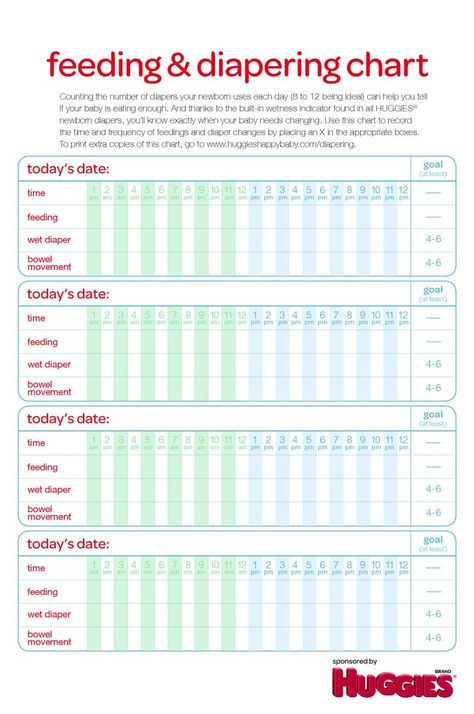 |
Every baby is unique — but one thing that’s pretty consistent is that breastfed babies eat more frequently than bottle-fed ones. That’s because breast milk is easily digested and empties from the stomach a lot quicker than formula.
Breastfed babies
There’s no rest for the weary. According to La Leche League International, you should begin nursing your baby within 1 hour of birth and provide about 8 to 12 feedings daily in the first few weeks of life (yeah, we’re exhausted for you).
At first, it’s important not to let your baby go more than 4 hours without feeding. You’ll likely need to wake them up if necessary, at least until breastfeeding is well established and they’re gaining weight appropriately.
As your baby grows and your milk supply amps up, your baby will be able to take in more milk in less time at one feeding. That’s when you might start to notice a more predictable pattern.
- 1 to 3 months: Your baby will feed 7 to 9 times per 24 hours.
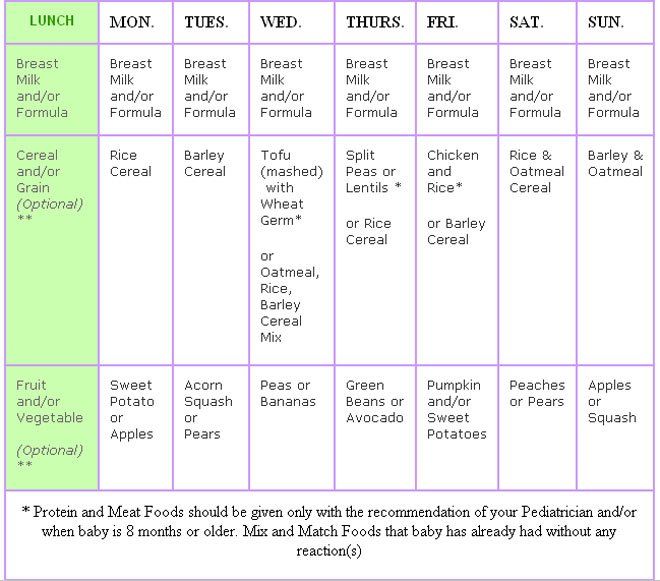
- 3 months: Feedings take place 6 to 8 times in 24 hours.
- 6 months: Your baby will feed around 6 times a day.
- 12 months: Nursing may drop to about 4 times a day. The introduction of solids at about 6 months helps to fuel your baby’s additional nutritional needs.
Keep in mind that this pattern is just one example. Different babies have different paces and preferences, along with other factors that influence the frequency of feedings.
Bottle-fed babies
Like breastfed babies, bottle-fed newborns should eat on demand. On average, that’s about every 2 to 3 hours. A typical feeding schedule may look like this:
- Newborn: every 2 to 3 hours
- At 2 months: every 3 to 4 hours
- At 4 to 6 months: every 4 to 5 hours
- At 6+ months: every 4 to 5 hours
For both breastfed and bottle-fed babies
- Don’t give liquids other than formula or breast milk to babies under a year old. That includes juices and cow’s milk.
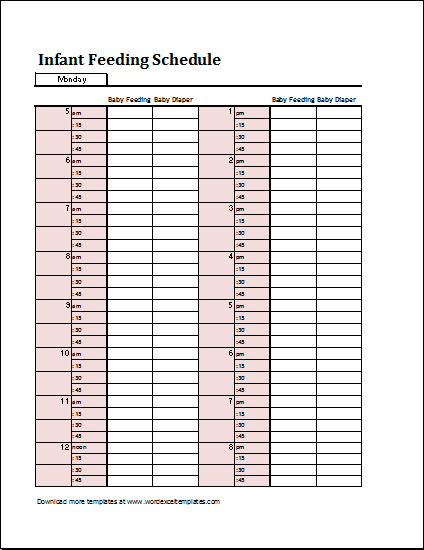 They don’t provide the right (if any) nutrients and can be upsetting to your baby’s tummy. Water can be introduced around 6 months when you start offering a cup.
They don’t provide the right (if any) nutrients and can be upsetting to your baby’s tummy. Water can be introduced around 6 months when you start offering a cup. - Don’t add baby cereal to a bottle.
- It can create a choking hazard.
- A baby’s digestive system isn’t mature enough to handle cereal until about 4 to 6 months of age.
- You could overfeed your baby.
- Don’t give your baby any form of honey until after their first birthday. Honey can be dangerous for a baby, occasionally causing what’s called infant botulism.
- Do adjust your expectations based on your baby and their unique needs. Premature babies are likely to follow feeding patterns according to their adjusted age. If your baby has challenges like reflux or failure to thrive, you may need to work with your doctor on the appropriate feeding schedule and amount they should be eating.
Schedules are the holy grail of every parent. Your child will naturally start to fall into a feeding pattern as their tummy grows and they can take in more breast milk or formula at one sitting.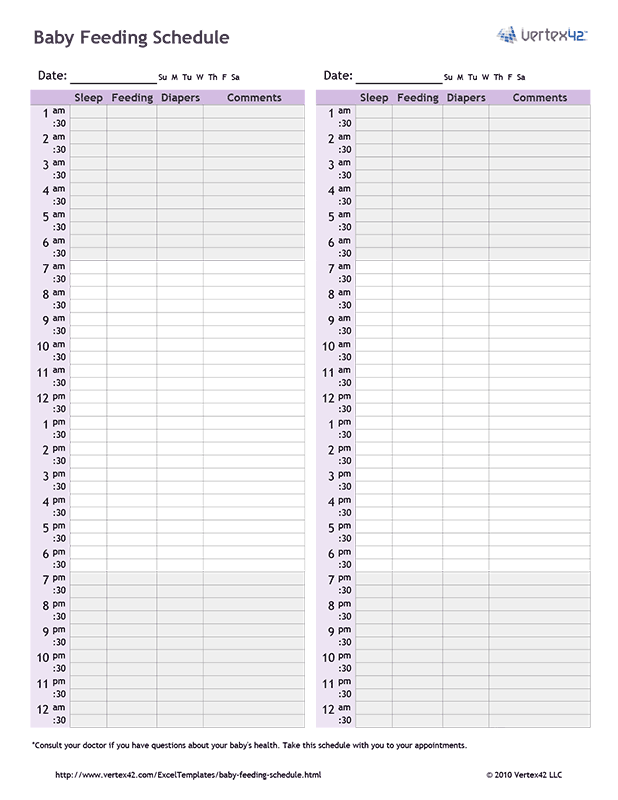 This may begin to happen between 2 and 4 months of age.
This may begin to happen between 2 and 4 months of age.
For now, though, focus on learning your baby’s hunger cues, such as:
- rooting around your chest, looking for a nipple.
- putting their fist in their mouth
- smacking or licking their lips
- fussing that can escalate quickly (don’t wait until your baby’s hangry to feed them)
Once your baby is a few months old, you may be able to introduce a sleep/feed schedule that works for you.
Let’s say, for example, your 4-month-old wakes every 5 hours for a feeding. That means if you feed at 9 p.m., your baby wakes around 2 a.m. But if you wake and feed the baby at 11 p.m., just before you go to bed, they may not rouse until 4 a.m., giving you a decent chunk of nighttime winks.
In general, if your baby seems hungry, feed them. Your baby will naturally eat more frequently during growth spurts, which typically occur around 3 weeks, 3 months, and 6 months of age.
Some babies will also “cluster feed,” meaning they’ll feed more frequently during certain periods and less at others.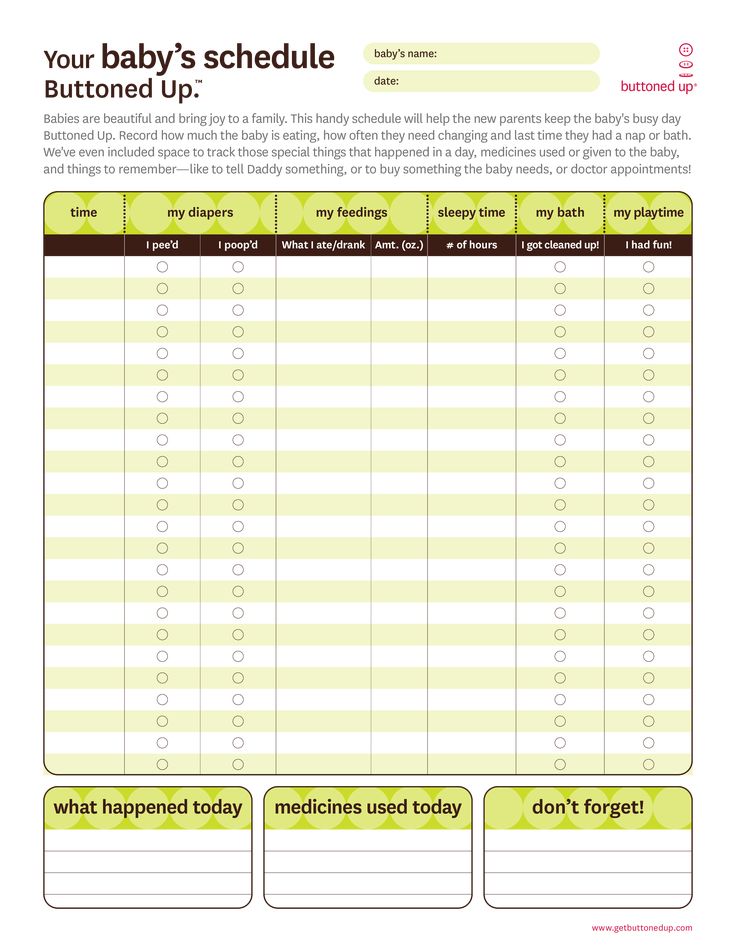 For example, your baby may cluster feed during the late afternoon and evening and then sleep longer at night (yay!). This is more common in breastfed babies than bottle fed babies.
For example, your baby may cluster feed during the late afternoon and evening and then sleep longer at night (yay!). This is more common in breastfed babies than bottle fed babies.
Worried about overfeeding? While this isn’t really possible to do with an exclusively breastfed baby, you can overfeed a baby who’s taking a bottle — especially if they’re sucking on the bottle for comfort. Follow their hunger cues, but talk to your pediatrician if you’re worried your little one may be overeating.
Your baby is probably ready for solids if they’re 4 to 6 months old and:
- have good head control
- seem interested in what you’re eating
- reach for food
- weigh 13 or more pounds
Which food to start with? The AAP now says it doesn’t really matter much in what order you introduce foods. The only real rule: Stick with one food for 3 to 5 days before offering another. If there’s an allergic reaction (rash, diarrhea, vomiting are common first signs), you’ll know which food is causing it.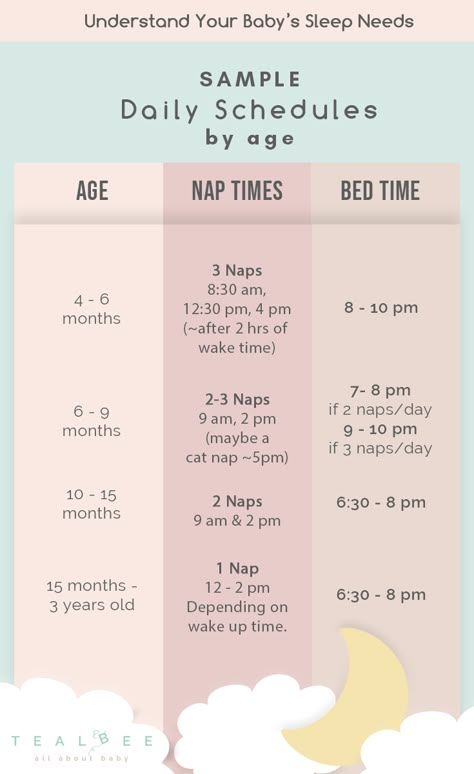
As your baby grows, move from pureed baby food to ones that have more texture (for example, mashed banana, scrambled egg, or well-cooked, chopped pasta). This generally happens around 8 to 10 months of age.
Your supermarket offers a variety of baby food products, but if you want to make your own, keep it sugar and salt free. Additionally, at this stage, don’t feed your baby anything that could be a choking hazard, including:
- hard foods, such as popcorn or nuts
- hard, fresh fruits, like apples; cook to soften or chop into very small pieces
- any meat that isn’t well cooked and very well chopped (this includes hot dogs)
- cheese cubes
- peanut butter (though talk to your pediatrician about this one — and the benefits of introducing diluted peanut butter before the age of 1)
As your baby nears their first birthday, they should be eating a variety of foods and taking in about 4 ounces of solids at each meal. Continue to offer breast milk or formula.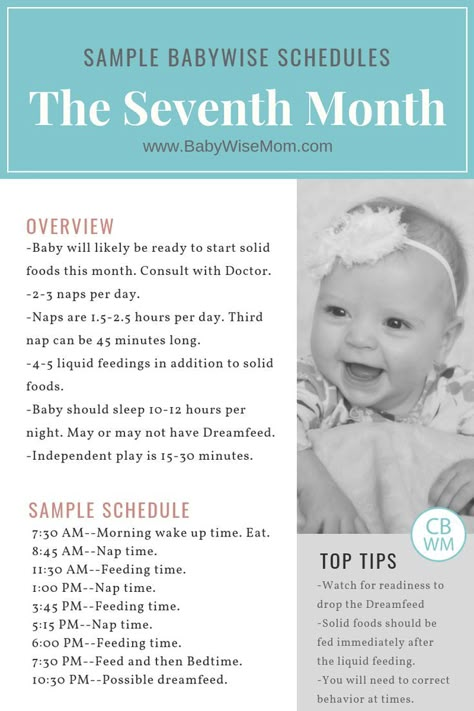 By 8 months, babies are drinking about 30 ounces a day.
By 8 months, babies are drinking about 30 ounces a day.
Oh yeah, and buy some stock in a company that makes stain-fighting laundry detergent. It’ll pay for college.
Babies aren’t cookie cutter. Some will gain weight easily, while others will have problems. Things that can affect a baby’s weight gain include:
- having a birth defect like a cleft lip or palate, which creates problems feeding
- having a milk protein intolerance
- being premature
- being fed with a bottle versus the breast
A 2012 study of more than 1,800 babies found that the infants who were fed with a bottle — regardless of whether the bottle contained breast milk or formula — gained more weight in the first year than babies who nursed exclusively.
Your baby’s doctor is the best one to advise you on a healthy weight range for your baby.
How, when, and what to feed a baby are top worries of every parent — but there’s good news: Most babies are pretty good judges of when they’re hungry and when they’re full — and they’ll let you know it.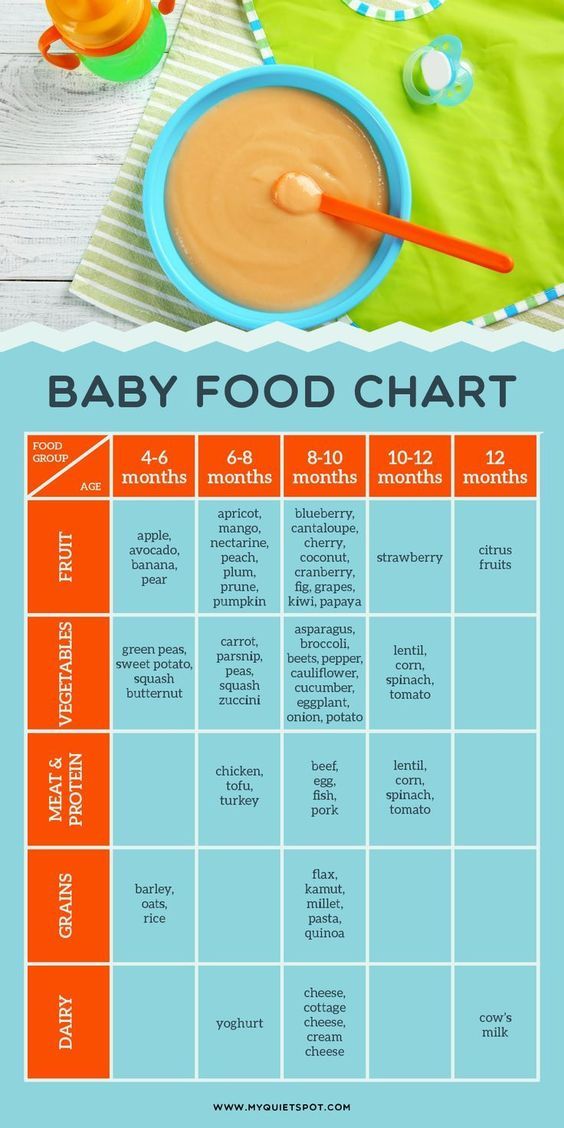
You just need to present them with the right choices at the right time and pay attention to their cues. If you have any questions or concerns, your pediatrician is there to help you along the way.
Baby schedules: When to start a daily routine with your baby
Many parents find that getting into a daily routine with their baby makes life much easier. To create a general schedule, observe when your baby naturally likes to eat, sleep, and play. Newborns eat and sleep around the clock, but starting around 2 to 4 months, you may start to observe patterns and establish a routine. Start by practicing a consistent bedtime routine every night, and plan to do roughly the same things at the same time every day.
Why are baby schedules useful?
A baby's needs aren't that complicated – food, sleep, play, and love pretty much sums it up. But knowing what your baby requires when, and how much of it, can be a real challenge. Not to mention balancing your baby's needs with your own and those of older children and other family members.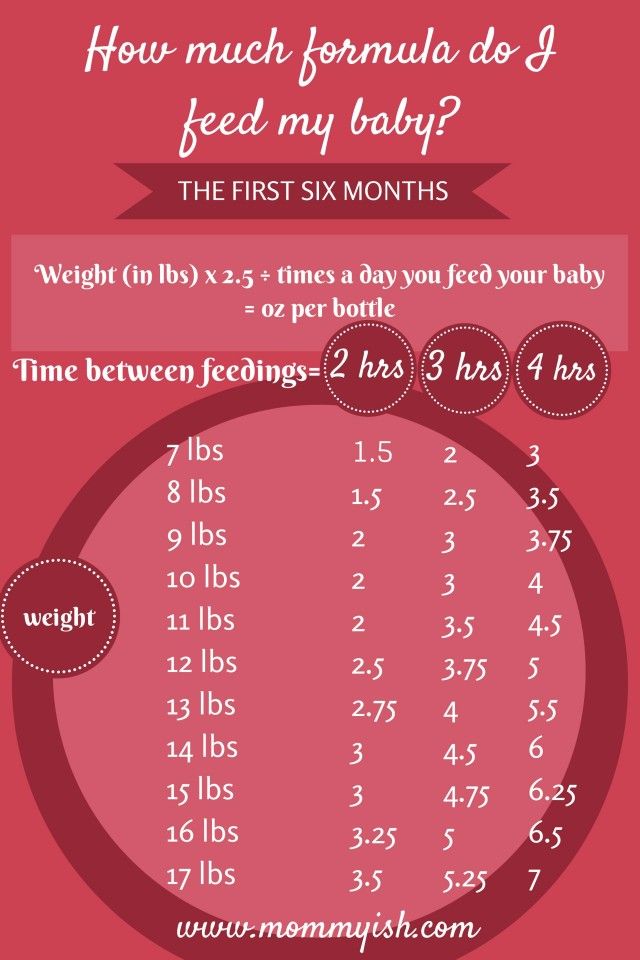
Many parents find that getting into a regular routine or schedule with their baby makes life much easier: It's almost like developing a personalized how-to manual for your child. As a parent, you'll have a predictable pattern for your days with your little one. And your baby will know what to expect – for example, that they get a bottle after their morning nap, then playtime or an outing.
Babies like to know that certain things will happen at a certain time each day. An added bonus: When you're ready to try leaving your baby with a sitter, the transition will be easier. Your baby will be reassured by their usual routine, and your caregiver will be able to anticipate their hunger, sleepiness, or desire to play or go out.
When to start a routine with your baby
Experts disagree on when and how to establish a routine – and even on whether you need a set schedule for your baby. But many say that babies are ready for a general schedule between 2 and 4 months of age.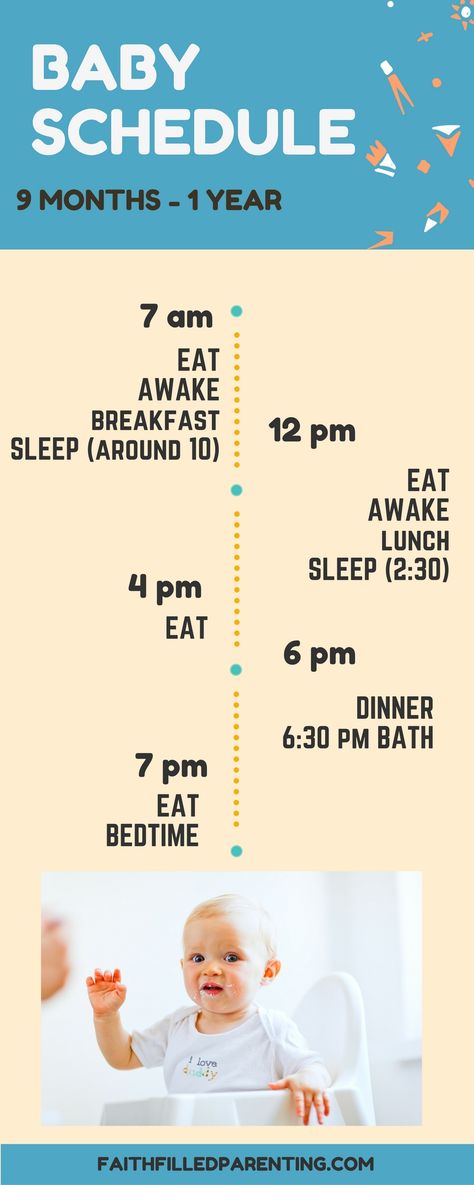
Most infants' sleeping and feeding habits become more consistent and predictable after three or four months. You may want to take this opportunity to encourage your baby to follow a more defined schedule.
Your baby may fall into fairly predictable patterns long before this, however. If that's the case, you can gently encourage your baby's emerging routine.
Tracking your baby's eating, sleeping, and alert times can give you an understanding of their natural rhythms and enable you to pinpoint developing patterns. In the days following delivery, many parents begin to write down or log when their newborn eats, when they poop and pee, when they sleep and for how long, and so on.
When figuring out your baby's schedule, it's essential that their well-being comes first. That means following the advice of your baby's doctor, plus your gut feeling and common sense, to determine what your baby needs when – no matter what a particular expert, book, or method says.
During the newborn period, it's especially important that your baby get enough breast milk or formula to avoid problems like poor weight gain and dehydration.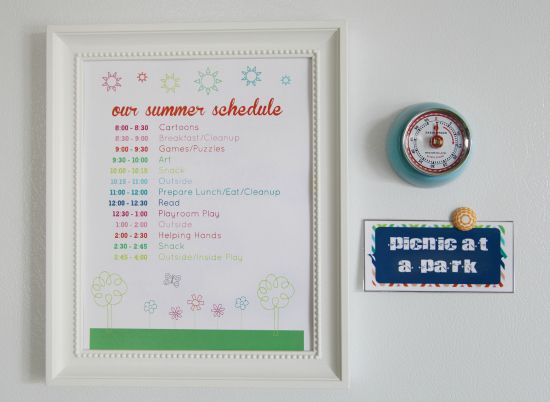 Babies should be fed when they're hungry – that is, fed on demand – according to the American Academy of Pediatrics (AAP). This means looking for your baby's hunger cues. Never withhold food or sleep when your baby seems to need it because it's not the "right" time.
Babies should be fed when they're hungry – that is, fed on demand – according to the American Academy of Pediatrics (AAP). This means looking for your baby's hunger cues. Never withhold food or sleep when your baby seems to need it because it's not the "right" time.
How to establish a baby schedule
Getting into a regular schedule for sleep, feeding, and activities can make life easier for you and your baby. But how to start? Below, find some helpful guidelines for establishing a routine that works.
Get your baby used to a bedtime routine early on
Babies don't have regular sleep cycles until around 6 months old, according to the AAP. While you can't force babies to be predictable in the first few months, you can develop a consistent routine that's in sync with your baby's natural rhythms. The easiest way to develop a regular bedtime is to create a bedtime routine that you and your baby can depend on night after night.
Keep the routine simple – for example, a warm bath, jammies, a feeding, then lights-out.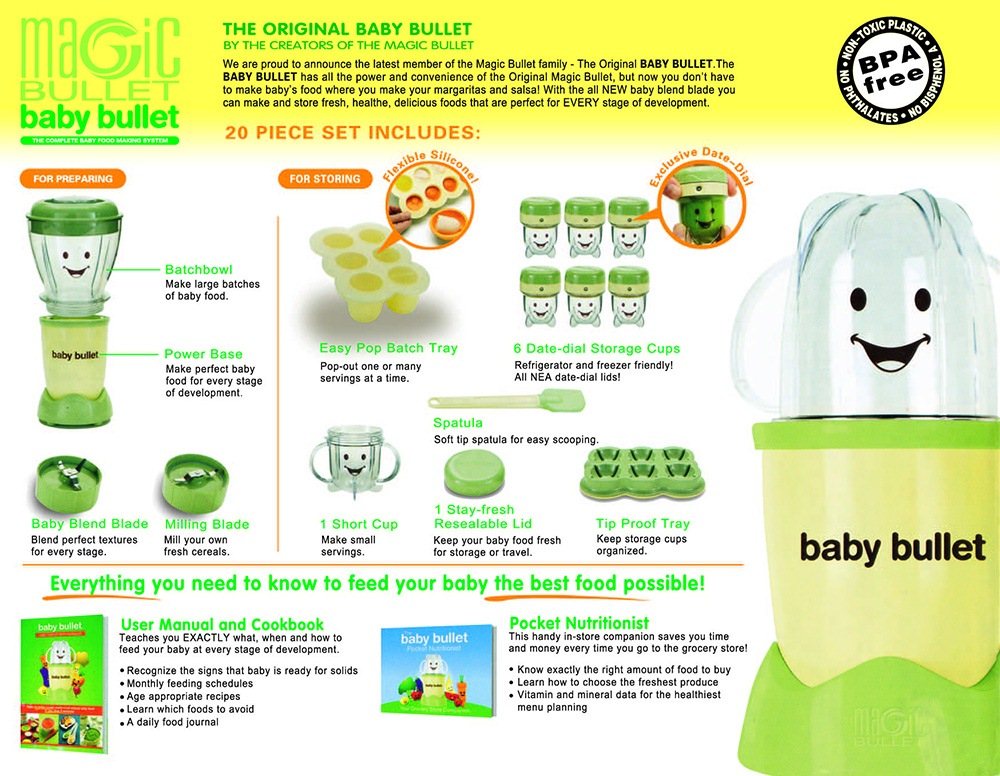 It's fine if feeding lulls your baby to sleep in the early months, but by 3 or 4 months you may want to try putting them down awake so they'll learn to fall asleep on their own. For more helpful information on establishing a bedtime routine, as well as other sleep tips, check out Baby Sleep 101, our premium class led by a pediatric sleep doctor from BabyCenter Courses.
It's fine if feeding lulls your baby to sleep in the early months, but by 3 or 4 months you may want to try putting them down awake so they'll learn to fall asleep on their own. For more helpful information on establishing a bedtime routine, as well as other sleep tips, check out Baby Sleep 101, our premium class led by a pediatric sleep doctor from BabyCenter Courses.
Teach your baby the difference between night and day
Many babies mix up their days and nights until about 3 to 4 months, sleeping long stretches during the day only to perk up once the sun goes down. Helping your baby learn to tell day from night is a key first step to getting into a workable routine.
Learn to read your baby's cues
Websites, books, your baby's doctor, and other parents can all help as you figure out an appropriate schedule for your baby. But your child is the most important guide and will tell you what they need – if you learn to read their cues.
Learning what your baby needs when takes time and patience.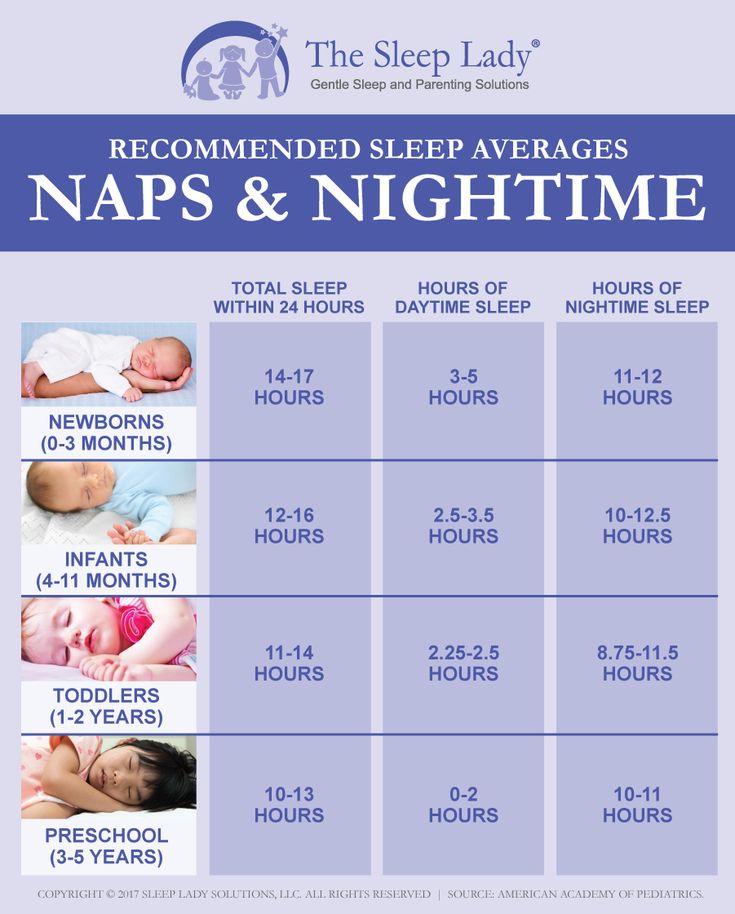 But you'll see patterns emerge over time. And if you log your baby's naps, feedings, and active times, you can use this record to come up with a timetable for doing things.
But you'll see patterns emerge over time. And if you log your baby's naps, feedings, and active times, you can use this record to come up with a timetable for doing things.
When starting out, put your baby's schedule first
If you're encouraging your baby to follow a schedule or observing their patterns to figure out a routine that works, make this process a top priority for at least the first couple of weeks. Avoid deviating from the routine with vacations, meals on the go, or outings that push naptime back.
Once you establish a pattern for your baby's sleeping, awake, and feeding times, changing things for an afternoon isn't likely to undo their habits. But it's best to keep your baby's schedule as consistent as possible while they're getting used to it.
Expect changes during growth spurts and milestones
Your child accomplishes so much in the first year. They'll nearly triple their weight and achieve some major feats like sitting up, crawling, and perhaps even walking.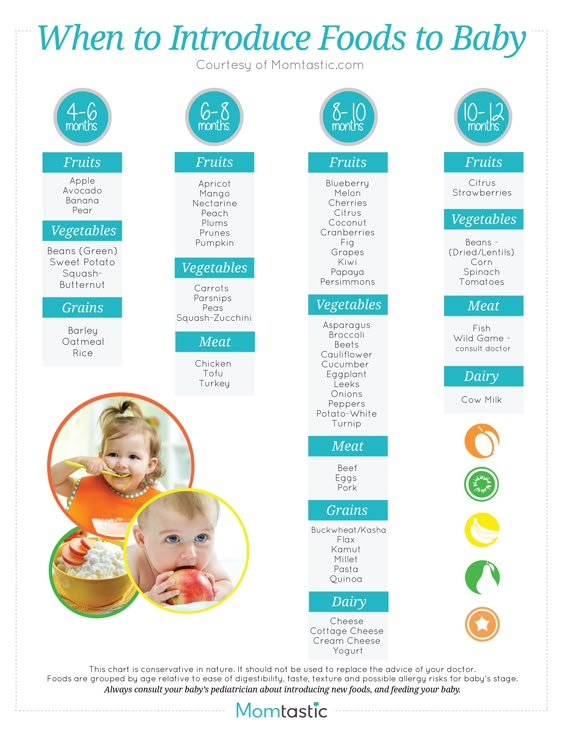
During periods of growth or when they're working to achieve a new milestone, don't be surprised if your baby diverges from their usual routine. They may be hungrier than usual, need more sleep, or return to waking up several times a night. Babies and toddlers regularly have sleep regressions as they approach big developmental leaps. Hang in there – your baby may be back on schedule shortly, or this may be a sign that you need to adjust your routine.
Adjust your baby's schedule to suit their age
It may feel like just when you've gotten into a predictable groove with your little one, it's time to change it again. As your baby gets older, they'll need fewer daytime naps and more playtime and stimulation. They'll also need to eat solid foods – first just once a day, but eventually several times a day. As these developmental shifts happen, your child's schedule will shift as well.
Don't expect perfection
Some parenting experts set the expectation that your baby's routine will always run like clockwork.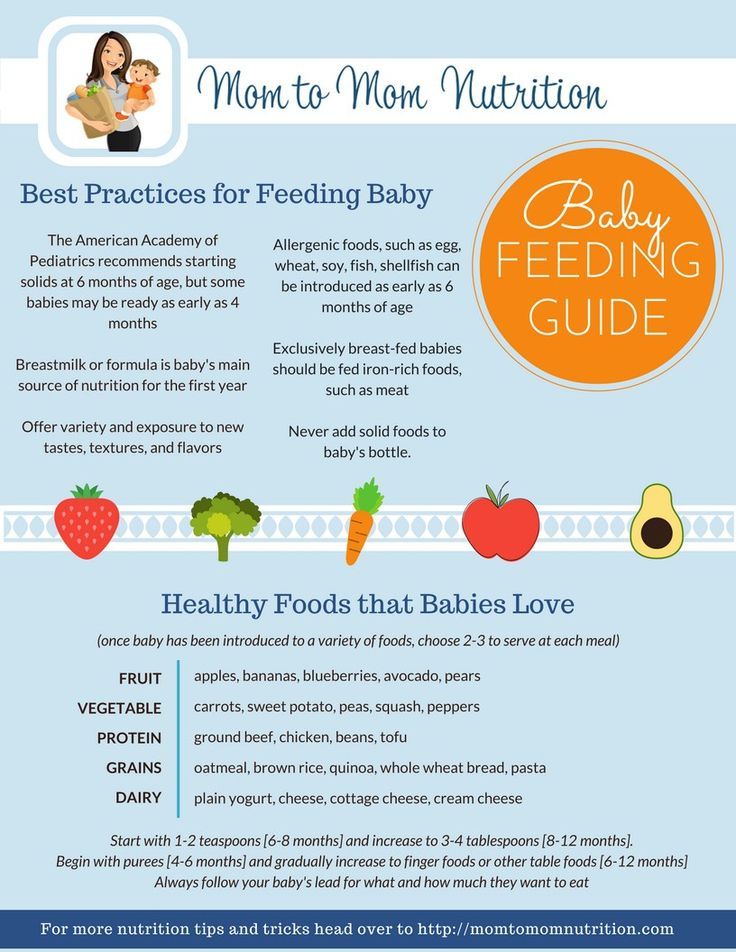 And though babies do like consistency, you can expect changes from day to day and as your baby grows.
And though babies do like consistency, you can expect changes from day to day and as your baby grows.
Sometimes, for whatever reason, your baby will want to skip a nap, have an extra snack, wake up before dawn, and so on. And life happens as well – vacations, older siblings, plans with friends and family, errands you need to take care of, and other factors will all come into play in your daily life with your baby. Variation is okay, as long as your baby is getting the sleep, play, food, care, and love they need to thrive.
Sample baby schedules
Wondering how other parents set up their baby's schedule, and what pediatricians recommend? See sample schedules and expert advice for babies of all ages:
- 1- or 2-month-old baby schedules
- 3- or 4-month-old baby schedules
- 5- or 6-month-old baby schedules
- 7- or 8-month-old baby schedules
- 9- or 10-month-old baby schedules
- 11- or 12-month-old baby schedules
Daily routine for a child under 1 year old
Daily routine is a system for distributing periods of sleep and wakefulness, meals, hygiene and health procedures, activities and independent human activities throughout the day.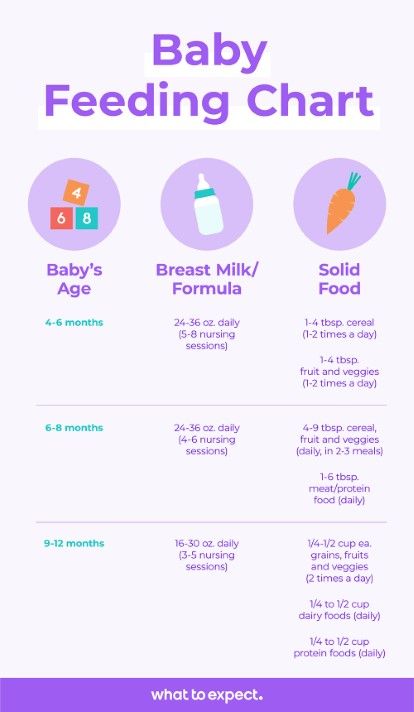
Compliance with a rational daily routine corresponding to the age characteristics of the child contributes to his healthy growth and development. Getting used to performing various types of activities at the same time, the child is prepared for the upcoming type of activity at every moment of time, which ensures their easier and faster implementation. Compliance with the correct daily routine provides a good mood for the child and maintains a keen interest in the study of the world around him, contributing to his normal motor and psychoverbal development.
The child's daily routine includes the following obligatory elements: diet, time spent outdoors during the day, frequency and duration of sleep, mandatory classes to develop skills in accordance with age, free time.
In the first months after birth, a healthy newborn baby sleeps for most of the day, since all external stimuli are very strong for the nervous system of a child, accustomed to a cozy intrauterine environment, and cause its rapid exhaustion.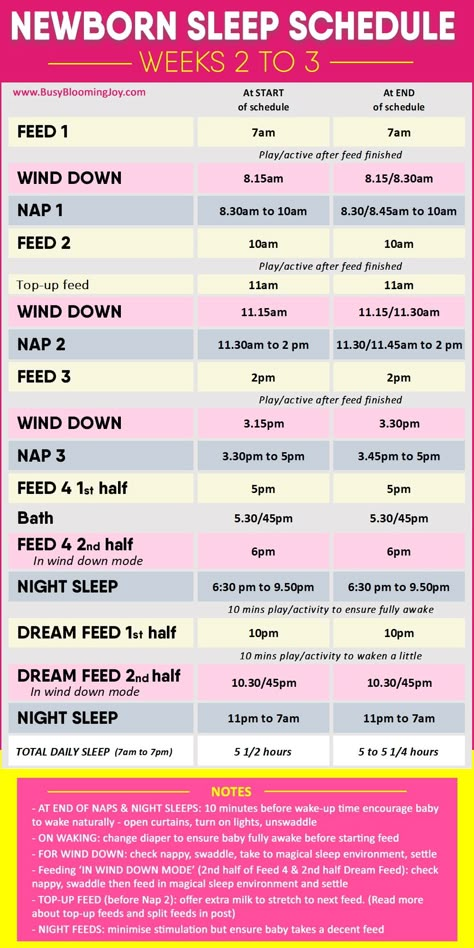 As the child grows older, the duration of sleep gradually decreases and the time of wakefulness increases.
As the child grows older, the duration of sleep gradually decreases and the time of wakefulness increases.
| Age | Daytime sleep mode | Night sleep | Wake mode |
| From birth to 2 months | 6 x 2.5 hours | 6 hours | During feeding |
| 2-4 months | 5 times 2-2.5 hours | 6.5 hours | 4 x 1.5 hours |
| 4-6 months | 4-5 times for 2 hours | 7 hours | 4 times 2 hours |
| 6-9 months | 3-4 times for 1.5-2 hours | 8 hours | 4 x 2.5 hours |
| 9-12 months | 2 x 1.5-2 hours | 9-10 hours | 4 times for 3-4 hours |
Closely related to the sleep-wake mode is the feeding mode of the baby. The sleep of a child in the first months of life is very sensitive and is easily disturbed under the influence of various extraneous stimuli, including hunger.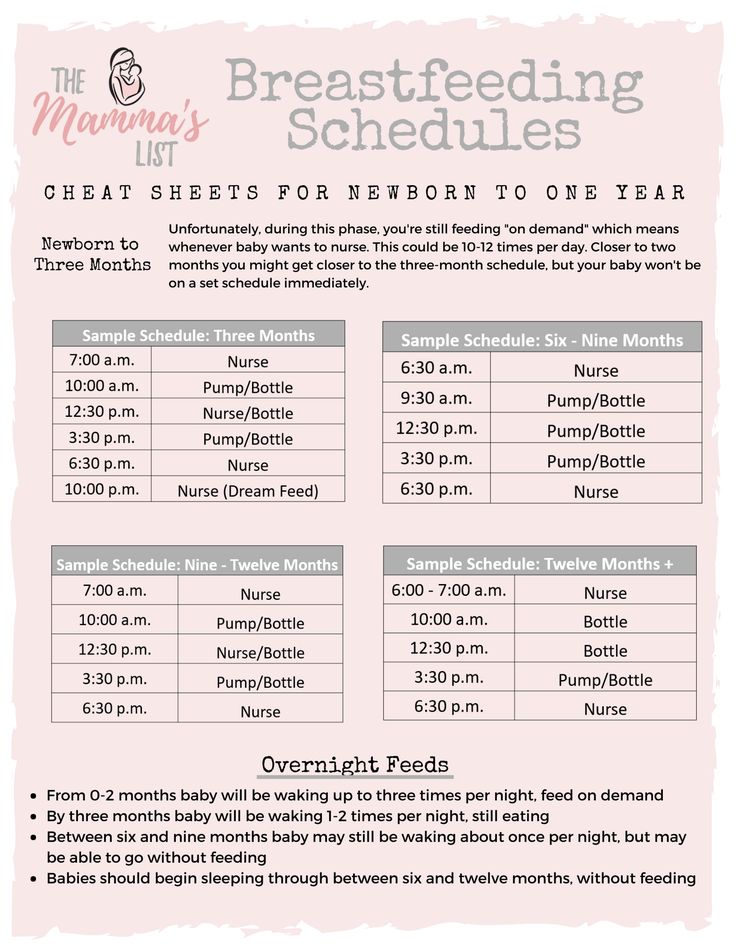
| Age | Mode | Example |
| From birth to 2 months | 7-8 times, every 3 hours | 6,9,12,15,18,21,24 (no night feeding) |
| From 2 to 6 months | 6-7 times, every 3.5 hours | 6, 9.30, 13, 16.30, 20, 23.30 (without night feeding) 6, 9.30, 13, 16.30, 20, 23.30, 03 (with night feeding) |
| From 7-12 months | 5 times, every 4 hours | 6,10,14,18,22 |
A child's stay in the fresh air is essential in the daily routine. The total duration of stay in the open air for children under 1 year of age should be at least 5-6 hours a day. Fresh air has a calming effect on the baby, improves metabolic processes, and increases the body's defenses. In the summer, all games and activities should be held outdoors; in the cold and transitional seasons, two one-time walks of 1.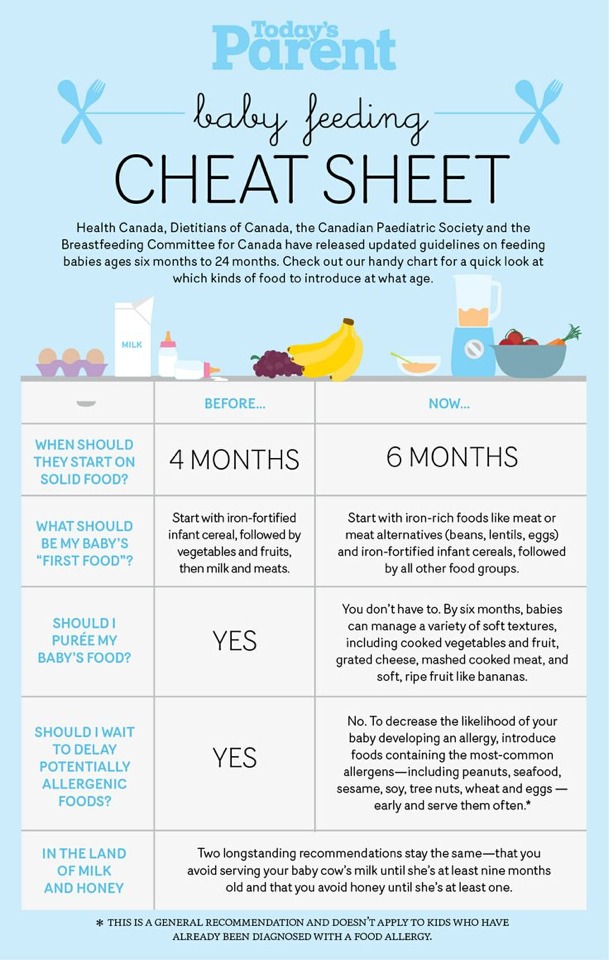 5-2 hours are provided.
5-2 hours are provided.
Fresh air also has a beneficial effect on sleep. By acting on the skin and mucous membranes of the nose and upper respiratory tract, it provides a faster fall asleep of the child and a higher quality of sleep. Sleeping outside can replace a walk, especially during the cold season.
The child's daily routine is generally individual, but ideally, one should strive to ensure that the child eats after waking up, and then stays awake until the next sleep. A well-slept baby eats with appetite and then calmly and actively plays or engages, and tired of games, easily goes to sleep.
When your baby is awake, try to keep him active and cheerful. It is necessary to dress the child in loose clothing that does not hinder movement, provide access to toys appropriate for his age, and most importantly, actively participate in games and activities with the baby as a whole family.
Author - Physiotherapist - DMITRIENKO T.G.
child development from 0 to 1 month
03/01/2019
18
The long-awaited day has come and we finally arrived home with the baby from the maternity hospital. And now, in place of the hospital calmness, where everything seemed so clear, a wave of emotions swept over me. When and how often should I put him to bed? How to combine sleep and feeding from the first days? Should a child have a regime or should not organize a clear schedule?
And now, in place of the hospital calmness, where everything seemed so clear, a wave of emotions swept over me. When and how often should I put him to bed? How to combine sleep and feeding from the first days? Should a child have a regime or should not organize a clear schedule?
All the knowledge was in theory, but it was not easy to put it into practice. Therefore, I share recommendations that it is good for a young mother to know in order to survive such a difficult first month!
Baby's routine
Before we talk about the baby's daily routine, it's useful to remember a few facts about the sleep of babies of this age: Yes, all children are different - some sleep more, others less. But in general, babies need to sleep about 16-18 hours a day.
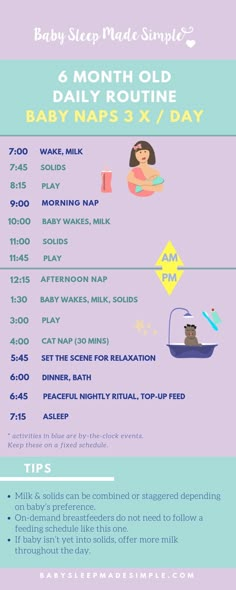 Therefore, all actions to organize the child's day regimen will be directed to this.
Therefore, all actions to organize the child's day regimen will be directed to this. Considering these facts, we can say that it is difficult to create a clear day schedule of 1 month.
Daytime sleep
Daytime dreams will not differ from nighttime. During the day, a newborn baby can sleep both 3-4 hours and 20-40 minutes in one dream.
The longest period of sleep can occur in a day.
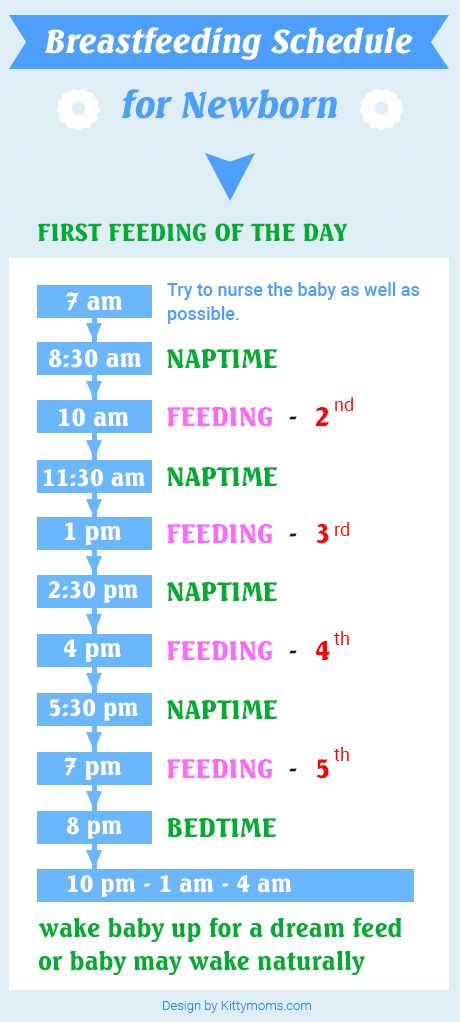
How do you know when a baby wants to sleep again? Focus on signs of fatigue in a child: if he rubs his eyes, looks at one point, sucks his thumb, then it's time for him to sleep. It is also recommended not to exceed the awake time for more than 50-60 minutes if the previous sleep was more than an hour. If the sleep was less than an hour, the period of activity of the crumbs will be the same amount of time. Overworking the child leads to long bedtimes, restless sleep at night and an incomprehensible daily routine.
Sleep at night
Sleep can be about 7-10 hours at night. The baby will wake up for feeding. If in the evening your baby began to cry non-stop for several hours, it may be colic. The period of colic lasts up to 6-8 weeks. After feeding, hold the baby upright - this will help his digestion, do a light massage of the tummy.
If you suspect that crying is not related to colic, be sure to contact your doctor.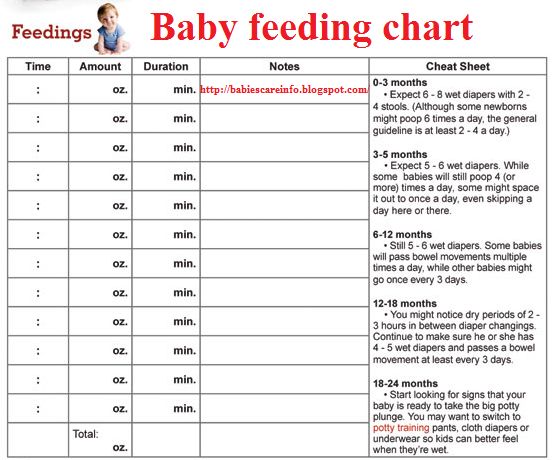 If you are formula feeding, talk to your pediatrician - it is possible that changing infant formula will improve the baby's condition.
If you are formula feeding, talk to your pediatrician - it is possible that changing infant formula will improve the baby's condition.
Confusion of day and night
Until 6-8 weeks of age, babies may confuse day and night due to an immature biological clock.
Take your baby out to bright light during the day and dim the lights at home in the evening. Use a night light with a warm, low light at night during feedings and diaper changes.
How to make it clear to a child of 1 month of age that it is time to start the day or go to bed?
Rituals will come to the rescue - daily repeated actions after waking up or going to bed. In the morning it can be hygiene procedures, and in the evening - bathing, quiet games, swaddling and a lullaby.
Baby bed
To prevent SIDS (Sudden Infant Death Syndrome), certain rules are followed when organizing a baby bed.
-
Always place your newborn on their back.
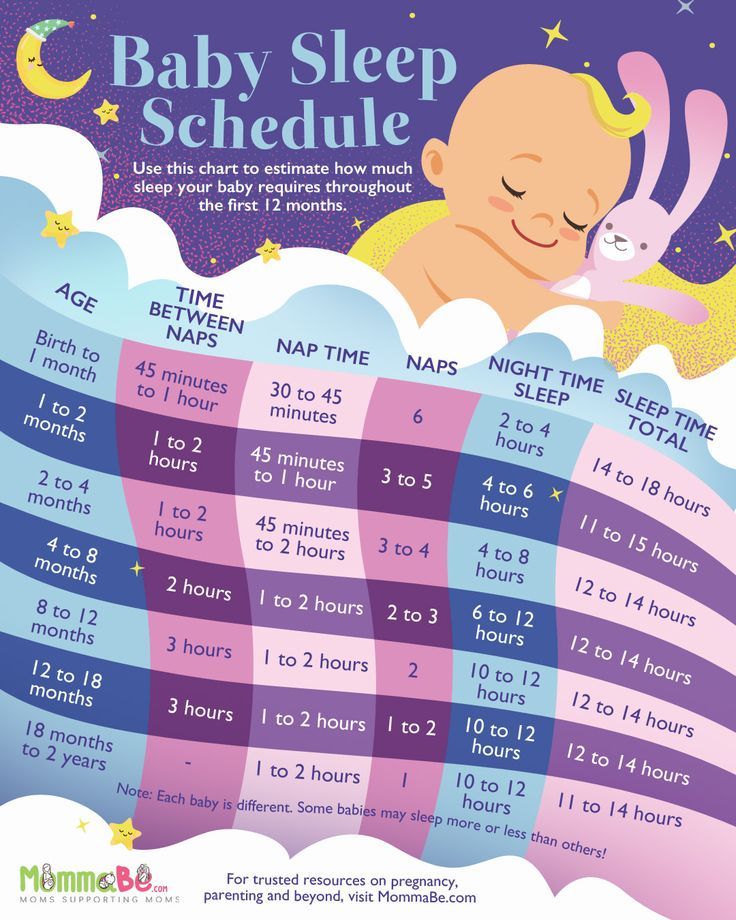 This is the safest position for a baby right now.
This is the safest position for a baby right now. -
Avoid overheating the baby - it is more dangerous for him than the cold. Therefore, pay attention to the temperature in the room: it should not exceed 21-23 degrees in winter and 25 degrees in summer.
-
The child needs to sleep on a flat, firm surface, without blankets, pillows, bumpers, toys or other things.
-
A separate nursery is not needed for up to six months, and sometimes up to a year - a crib in the parents' room is an ideal option for a child to relax. You can remove one wall of the crib and attach it to the bed of the parents. So the baby will be as close as possible to mom at night, but at the same time on a separate surface.
Tips to help your newborn sleep
Feeding your newborn
Feeding on demand is considered to be the best way to manage your newborn's diet.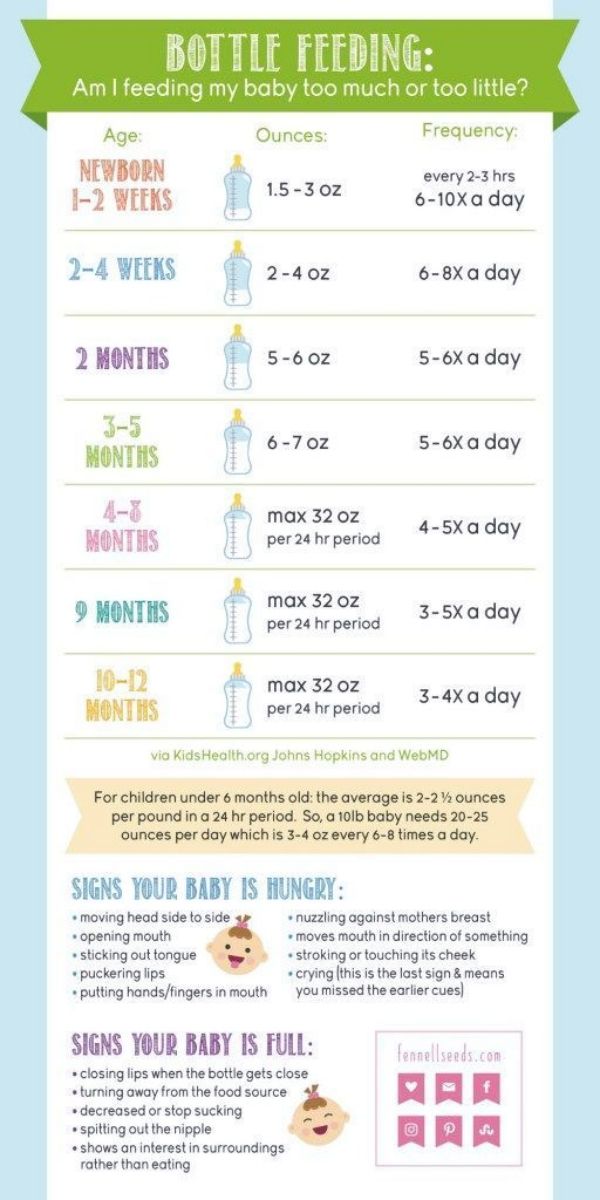
In the early days, breastfeed as often as possible. This stimulates milk production. We feed from 15 to 90 minutes. Prolonged feeding allows a newborn baby not only to satisfy hunger, but also to survive the stress after childbirth and get used to the new world. After the baby is likely to fall asleep. Night feedings are equally important for both the baby and the mother. They will mostly occur every 3-4 hours.
To improve lactation, also try to feed in the early hours of the night.
If a breastfed baby is eating well and gaining weight, he does not need additional food and fluids until 4-6 months of age.
Walks
An important part of the daily routine of a newborn this month. Walking outside helps set your baby's biological clock and improves sleep. You can walk with a healthy and full-term baby starting from the 10th day of life. Increase the time of outdoor walks gradually until the child is 1 year old, starting from 10 minutes in winter and 20 minutes in summer.